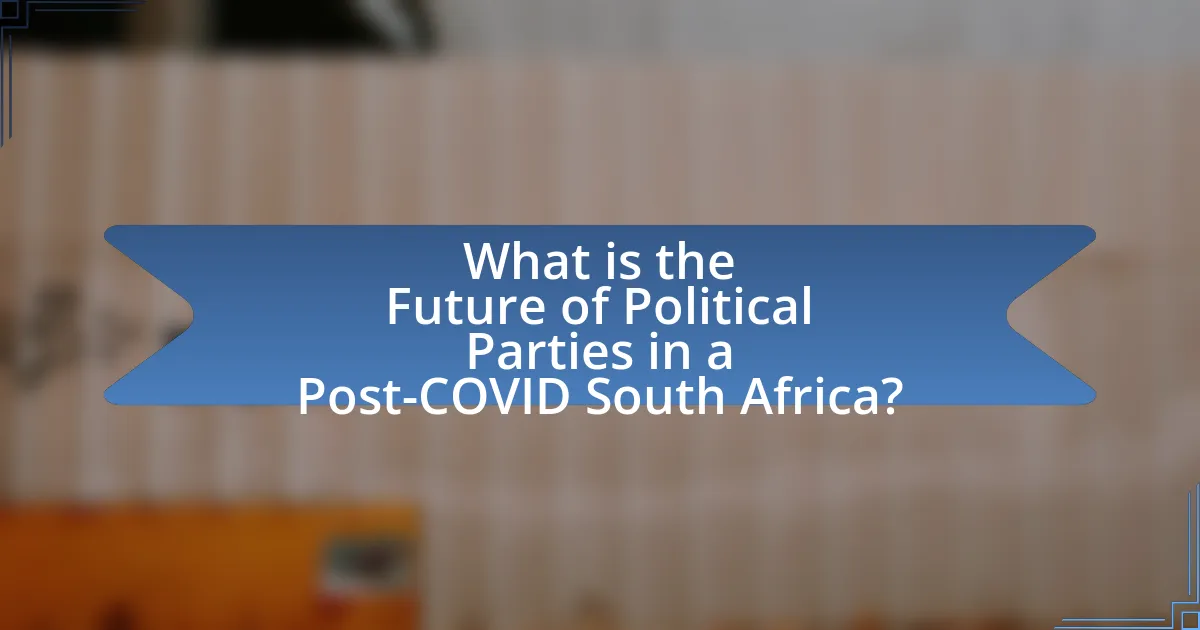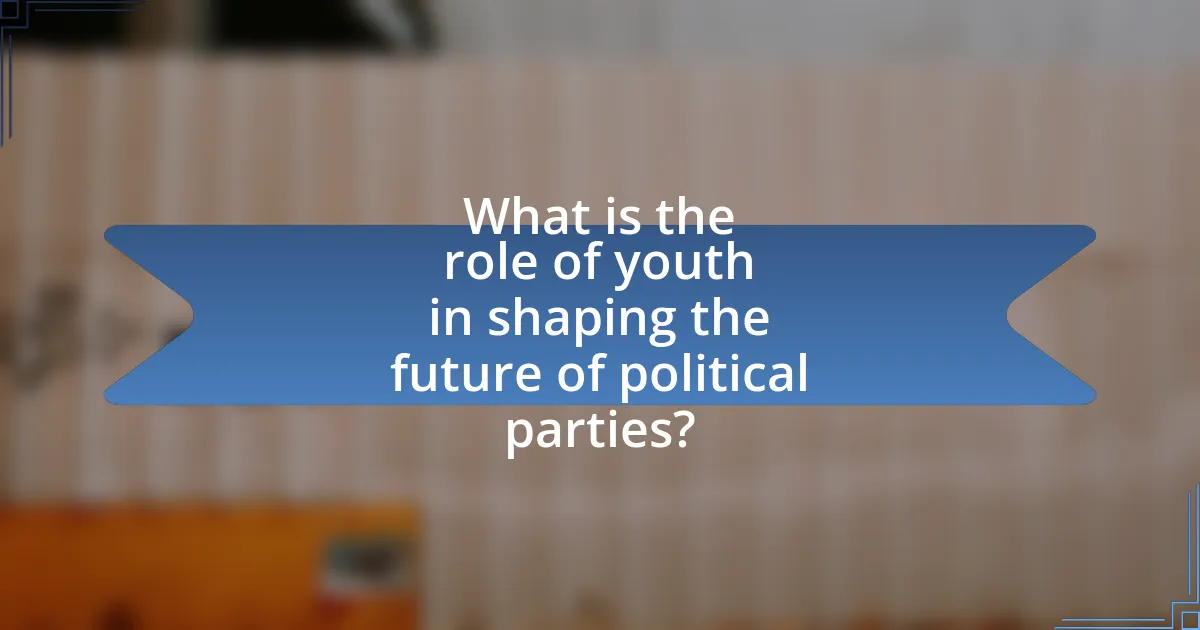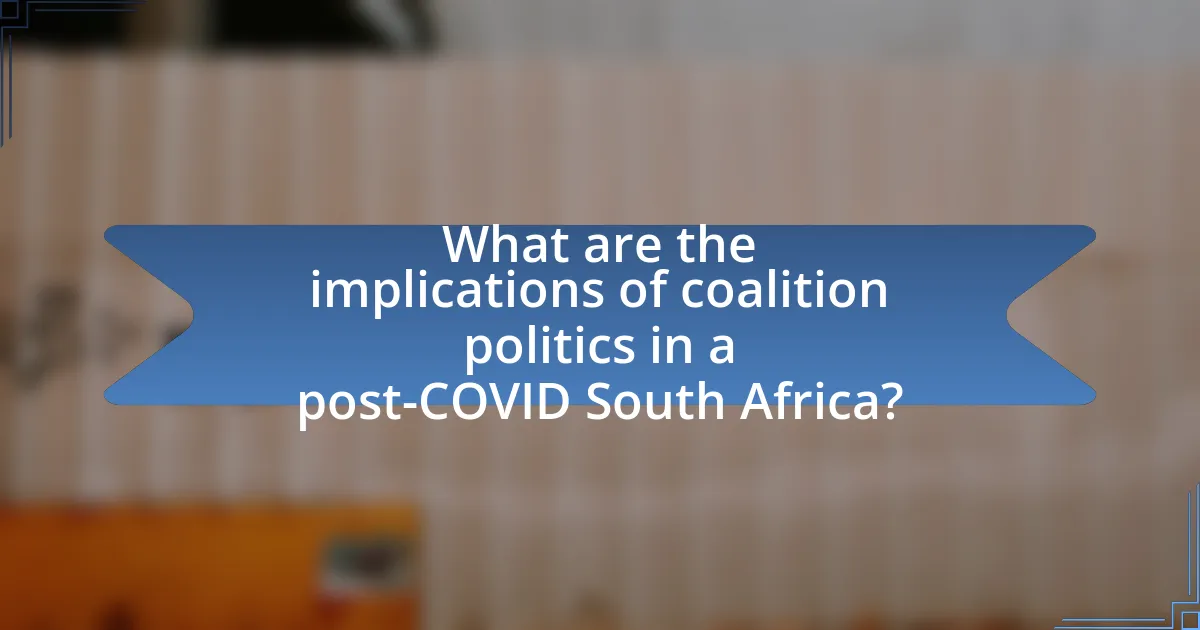The article examines the future of political parties in post-COVID South Africa, highlighting the anticipated fragmentation and emergence of new political movements as citizens seek alternatives to traditional parties. It discusses the impact of the pandemic on party operations, voter behavior, and strategies, emphasizing the shift towards digital engagement and the importance of addressing pressing issues such as economic recovery and social justice. Additionally, the article explores the challenges political parties face, including economic instability and declining public trust, while also identifying opportunities for engagement with younger demographics and the potential for coalition politics in a changing political landscape.

What is the Future of Political Parties in a Post-COVID South Africa?
The future of political parties in a post-COVID South Africa is likely to involve increased fragmentation and the rise of new political movements. The pandemic has exposed systemic inequalities and governance challenges, prompting citizens to seek alternatives to traditional parties. For instance, the Economic Freedom Fighters and other emerging parties have gained traction by addressing issues such as unemployment and social justice, reflecting a shift in voter priorities. Additionally, the decline in trust towards established parties, evidenced by recent electoral trends, suggests that political parties will need to adapt their strategies to remain relevant and responsive to the evolving needs of the electorate.
How has COVID-19 impacted political parties in South Africa?
COVID-19 has significantly impacted political parties in South Africa by altering their operational dynamics and public engagement strategies. The pandemic forced parties to adapt to virtual campaigning and digital communication, as traditional rallies and in-person events were restricted. For instance, the African National Congress (ANC) and the Democratic Alliance (DA) shifted to online platforms to maintain voter engagement, reflecting a broader trend towards digitalization in political processes. Additionally, the crisis highlighted governance issues, with parties facing scrutiny over their responses to health and economic challenges, influencing public perception and electoral prospects. This shift has led to increased competition among parties to effectively communicate their policies and responses to the pandemic, reshaping the political landscape in South Africa.
What changes in voter behavior have emerged due to the pandemic?
The pandemic has led to significant changes in voter behavior, including an increase in mail-in voting and a heightened focus on digital engagement. Research indicates that many voters, concerned about health risks, opted for remote voting methods, with mail-in ballots rising by over 200% in some regions during the 2020 elections. Additionally, political parties have adapted by enhancing their online presence and utilizing social media platforms to reach constituents, reflecting a shift towards digital campaigning. This transformation in voter behavior is likely to influence future electoral strategies and party dynamics in South Africa.
How have political party strategies evolved in response to COVID-19?
Political party strategies have evolved significantly in response to COVID-19 by prioritizing public health messaging and digital engagement. Parties have shifted their focus to address immediate health concerns, emphasizing safety protocols and vaccine distribution in their platforms. For instance, many parties have increased their use of social media and virtual town halls to maintain communication with constituents, reflecting a broader trend towards digital campaigning. Additionally, parties have adapted their policy proposals to include economic recovery plans that address the pandemic’s impact, such as job creation and support for small businesses. This evolution is evidenced by the increased allocation of resources towards health initiatives and economic support measures in party manifestos and public statements during the pandemic.
What challenges do political parties face in a post-COVID environment?
Political parties in a post-COVID environment face significant challenges, including economic instability, shifting voter priorities, and increased public scrutiny. Economic instability arises from the pandemic’s impact on job markets and public finances, leading to heightened demands for effective governance and social support. Shifting voter priorities reflect a growing focus on health care, economic recovery, and social justice, compelling parties to adapt their platforms accordingly. Increased public scrutiny is evident as citizens demand transparency and accountability, particularly regarding pandemic responses and resource allocation. These challenges necessitate that political parties reassess their strategies to remain relevant and effectively address the evolving needs of the electorate.
How has economic instability affected political party funding?
Economic instability has significantly reduced political party funding by limiting the financial resources available from both individual donors and corporate sponsors. During periods of economic downturn, individuals often face financial constraints, leading to decreased contributions to political parties. For instance, in South Africa, the economic challenges exacerbated by the COVID-19 pandemic resulted in a reported decline in donations to political parties, with the Electoral Commission of South Africa noting a drop in funding levels in 2020 compared to previous years. Additionally, corporations tend to cut back on political donations during economic uncertainty, as they prioritize their own financial stability. This dual impact of reduced individual and corporate contributions has led to a more challenging fundraising environment for political parties, forcing them to adapt their strategies and seek alternative funding sources.
What role does public trust play in the future of political parties?
Public trust is essential for the future of political parties, as it directly influences voter engagement and party legitimacy. In a post-COVID South Africa, where citizens are increasingly skeptical of political institutions, maintaining and rebuilding public trust is crucial for parties to secure electoral support. Research indicates that higher levels of public trust correlate with increased voter turnout and participation in democratic processes, as seen in various global contexts where trust in government institutions has been linked to political stability and effective governance. Therefore, political parties must prioritize transparency, accountability, and responsiveness to foster trust and ensure their relevance and success in the evolving political landscape.
What opportunities exist for political parties in a post-COVID South Africa?
Political parties in post-COVID South Africa have the opportunity to engage with citizens on pressing issues such as economic recovery, healthcare reform, and social justice. The pandemic has heightened public awareness of inequalities and governance challenges, allowing parties to position themselves as advocates for change. For instance, the economic impact of COVID-19 has led to increased demand for policies that support job creation and small businesses, which parties can leverage to gain voter support. Additionally, the shift towards digital communication during the pandemic presents an opportunity for parties to enhance their outreach and mobilization efforts through social media and online platforms, thus reaching a broader audience.
How can political parties leverage technology for engagement?
Political parties can leverage technology for engagement by utilizing social media platforms, mobile applications, and data analytics to connect with constituents effectively. Social media allows parties to disseminate information rapidly, engage in real-time discussions, and mobilize supporters, as evidenced by the significant increase in voter engagement during the 2020 U.S. elections, where platforms like Twitter and Facebook played crucial roles. Mobile applications can facilitate direct communication and feedback from voters, enhancing transparency and responsiveness. Additionally, data analytics enables parties to understand voter preferences and tailor their messages accordingly, improving outreach efforts. This multifaceted approach not only fosters greater participation but also strengthens the relationship between political parties and the electorate in a post-COVID context.
What new political movements or ideologies are emerging?
Emerging political movements in post-COVID South Africa include the rise of populism, environmental activism, and social justice movements. These movements reflect a growing discontent with traditional political parties and a demand for more responsive governance. For instance, the Economic Freedom Fighters (EFF) have gained traction by advocating for land reform and economic redistribution, appealing to marginalized communities. Additionally, movements focused on climate change, such as Extinction Rebellion, are gaining visibility, emphasizing the need for sustainable policies. Social justice movements, including those advocating for gender equality and anti-racism, are also becoming more prominent, reflecting a broader societal shift towards inclusivity and equity.
How can political parties adapt to the changing landscape?
Political parties can adapt to the changing landscape by embracing digital transformation and enhancing grassroots engagement. The COVID-19 pandemic accelerated the shift towards online platforms for communication and campaigning, making it essential for parties to utilize social media, virtual town halls, and data analytics to connect with voters effectively. For instance, during the 2021 local elections in South Africa, parties that leveraged digital tools saw increased voter interaction and participation, demonstrating the importance of adapting to technological advancements. Additionally, fostering community involvement through local initiatives can help parties remain relevant and responsive to the needs of constituents, as evidenced by the success of localized campaigns that address specific community issues.
What strategies can political parties implement to remain relevant?
Political parties can implement strategies such as embracing digital engagement, focusing on grassroots mobilization, and adapting policies to address current social issues to remain relevant. Digital engagement allows parties to reach a broader audience, particularly younger voters, through social media and online platforms, which have become essential for communication in a post-COVID environment. Grassroots mobilization fosters community involvement and builds trust, as seen in successful campaigns that prioritize local issues and direct voter interaction. Additionally, adapting policies to reflect the evolving needs of society, such as addressing economic recovery and public health, ensures that parties resonate with constituents’ concerns, as evidenced by the increased voter support for parties that actively engage with pressing issues during the pandemic.

What is the role of youth in shaping the future of political parties?
Youth play a crucial role in shaping the future of political parties by driving innovation, advocating for progressive policies, and increasing voter engagement. Their active participation in political discourse and social movements influences party platforms, as seen in South Africa where youth-led initiatives have pushed for reforms on issues like education and unemployment. According to the 2021 South African Youth Survey, 63% of young people expressed a desire for political involvement, highlighting their potential to reshape party ideologies and strategies. This demographic’s unique perspectives and digital savviness enable them to mobilize support and challenge traditional political narratives, ultimately steering political parties towards more inclusive and responsive governance.
How are young voters influencing political agendas?
Young voters are significantly influencing political agendas by prioritizing issues such as climate change, social justice, and economic inequality. Their engagement in social media campaigns and grassroots movements amplifies their voices, leading political parties to adapt their platforms to resonate with these concerns. For instance, in South Africa, the rise of youth-led organizations has pressured established parties to address unemployment and education reform, reflecting the priorities of younger demographics. This shift is evident in the increased focus on policies that promote sustainability and equity, as parties recognize the electoral power of the youth vote, which accounted for approximately 50% of the electorate in recent elections.
What issues are most important to the youth in South Africa?
The most important issues to the youth in South Africa include unemployment, education, and social justice. Unemployment rates among South African youth are alarmingly high, with statistics indicating that approximately 63% of young people aged 15-24 are unemployed as of 2023. Education remains a critical concern, as many youth seek quality education and vocational training to improve their job prospects. Additionally, social justice issues, including inequality and access to basic services, resonate strongly with the youth, who advocate for systemic change to address these disparities. These issues reflect the broader socio-economic challenges faced by the youth in the country.
How can political parties engage effectively with younger demographics?
Political parties can engage effectively with younger demographics by utilizing digital platforms and social media to communicate their messages and policies. Research indicates that 95% of young people aged 18-29 use social media, making it a crucial channel for outreach. By creating relatable content, such as videos and interactive posts, parties can capture the attention of younger voters. Additionally, involving youth in decision-making processes and policy formulation can foster a sense of ownership and relevance, as evidenced by initiatives like youth councils in various countries that have successfully increased political participation among young people.
What impact does social media have on political party dynamics?
Social media significantly alters political party dynamics by enhancing communication, mobilization, and engagement among party members and the electorate. Political parties utilize platforms like Twitter and Facebook to disseminate information rapidly, allowing them to respond to events in real-time and shape public discourse. For instance, during the 2019 South African elections, the African National Congress and the Economic Freedom Fighters effectively used social media to reach younger voters, which contributed to their electoral strategies. Additionally, social media facilitates grassroots organizing, enabling parties to mobilize supporters for rallies and campaigns more efficiently. This shift has led to a more decentralized form of political engagement, where traditional party hierarchies are challenged by the influence of online communities and influencers.
How are political parties using social media to connect with voters?
Political parties are using social media to connect with voters by engaging them through targeted content, real-time communication, and interactive platforms. For instance, parties create tailored messages that resonate with specific demographics, utilizing data analytics to identify voter preferences and behaviors. According to a study by the Pew Research Center, 69% of adults in South Africa use social media, making it a vital tool for outreach. Additionally, platforms like Facebook and Twitter allow parties to respond quickly to voter inquiries and concerns, fostering a sense of community and involvement. This strategy not only enhances voter engagement but also helps parties to mobilize support during elections, as evidenced by the increased voter turnout in regions where social media campaigns were prominent.
What challenges do political parties face in managing their online presence?
Political parties face several challenges in managing their online presence, including misinformation, rapid technological changes, and audience engagement. Misinformation can undermine credibility, as false narratives spread quickly on social media platforms, impacting public perception. Rapid technological changes require parties to continuously adapt their strategies and tools, which can strain resources and expertise. Additionally, engaging diverse audiences effectively is challenging due to varying preferences and behaviors across demographic groups, making it difficult to create content that resonates universally. These challenges necessitate strategic planning and resource allocation to maintain a robust and credible online presence.

What are the implications of coalition politics in a post-COVID South Africa?
Coalition politics in post-COVID South Africa implies increased political fragmentation and the necessity for compromise among diverse parties. The pandemic has exacerbated existing socio-economic challenges, leading to a more complex political landscape where no single party can secure an outright majority. This fragmentation necessitates coalitions, which can foster collaboration but may also lead to instability and policy gridlock. For instance, the 2021 local elections demonstrated a shift towards multiparty governance, with several municipalities being governed by coalitions, reflecting the electorate’s desire for diverse representation and accountability.
How might coalition governments evolve in the current political climate?
Coalition governments in the current political climate may evolve towards increased stability and collaboration among diverse political parties. This evolution is driven by the necessity for parties to unite in response to complex challenges such as economic recovery and social inequality exacerbated by the COVID-19 pandemic. Historical examples, such as the coalition formed in South Africa post-1994, demonstrate that diverse parties can work together to achieve common goals, suggesting that current parties may adopt similar strategies to enhance governance and public trust.
What are the potential benefits and drawbacks of coalition politics?
Coalition politics can lead to both significant benefits and notable drawbacks. The benefits include increased representation, as diverse political parties can come together to reflect a broader spectrum of public opinion, which can enhance democratic legitimacy. For instance, in South Africa, coalition governments can address the needs of various demographic groups, fostering inclusivity in decision-making processes. Additionally, coalitions can promote stability by requiring consensus, which may lead to more thoughtful and comprehensive policy-making.
Conversely, the drawbacks of coalition politics often involve instability and inefficiency. Coalitions can struggle with internal disagreements, leading to gridlock and a lack of decisive action on critical issues. Historical examples, such as the coalition government in South Africa post-1994, illustrate how differing party agendas can complicate governance and slow down legislative processes. Furthermore, the need for compromise may dilute policy effectiveness, as parties may have to abandon key principles to maintain coalition unity.
How can political parties negotiate effectively in coalitions?
Political parties can negotiate effectively in coalitions by establishing clear communication channels and setting common goals. Effective negotiation requires transparency in discussions, where parties openly share their priorities and concerns, fostering trust. Additionally, utilizing a structured negotiation framework, such as interest-based bargaining, allows parties to focus on mutual interests rather than positions, leading to more collaborative solutions. Historical examples, such as the coalition negotiations in South Africa post-1994, demonstrate that successful coalitions often arise from a commitment to compromise and shared governance, which can enhance stability and policy implementation.
What lessons can be learned from international political party trends?
International political party trends reveal that adaptability and responsiveness to public sentiment are crucial for electoral success. For instance, parties that have embraced digital engagement and social media strategies, such as the Democratic Party in the United States, have seen increased voter mobilization and participation. Additionally, the rise of populist movements across Europe demonstrates that addressing economic inequality and social issues can resonate with disillusioned voters, as seen with parties like Italy’s Five Star Movement. These trends indicate that political parties must evolve to meet changing societal needs and leverage technology to connect with constituents effectively.
How have other countries adapted their political parties post-pandemic?
Countries have adapted their political parties post-pandemic by increasing digital engagement and restructuring party operations to enhance responsiveness. For instance, in Germany, political parties have embraced virtual campaigning and online member engagement platforms, which have led to a significant increase in participation among younger voters. Similarly, in Canada, parties have shifted to hybrid models of governance, allowing for both in-person and virtual meetings, which has improved accessibility and inclusivity. These adaptations reflect a broader trend of leveraging technology to maintain political relevance and connect with constituents in a changing landscape.
What best practices can South African political parties adopt?
South African political parties can adopt best practices such as enhancing transparency, engaging in grassroots mobilization, and utilizing digital platforms for communication. Transparency can be improved by regularly disclosing financial information and decision-making processes, which builds public trust and accountability. Grassroots mobilization involves actively involving communities in political discourse and decision-making, fostering a sense of ownership and participation among citizens. Utilizing digital platforms allows parties to reach a broader audience, especially younger voters, and facilitates real-time engagement and feedback. These practices are supported by studies indicating that increased transparency and community engagement lead to higher voter trust and participation in democratic processes.
What practical steps can political parties take to prepare for the future?
Political parties can prepare for the future by adopting digital transformation strategies to enhance engagement and outreach. This includes investing in technology for virtual campaigning, utilizing social media platforms for real-time communication, and implementing data analytics to understand voter preferences. For instance, during the 2021 local elections in South Africa, parties that effectively used digital tools saw increased voter interaction and participation, demonstrating the importance of adapting to technological advancements. Additionally, fostering internal diversity and inclusivity can help parties better represent the electorate, as studies show that diverse leadership leads to more innovative solutions and policies.


